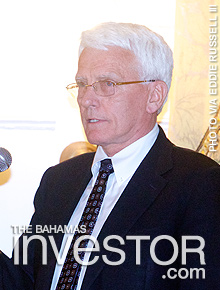| Source: Date: Updated: |
TheBahamasInvestor.com
Monday, February 24, 2014 Monday, February 24, 2014 |
Pictured: Arbitration expert Jan Paulsson speaking at at the 1st Dame Joan Sawyer Lecture February 21, 2014. (Photo via Eddie Russell III/Public Relations)
Positioning The Bahamas as a successful international arbitration centre to resolve disputes will not be automatic, according to international arbitration expert Jan Paulsson.
Addressing members of the judiciary and business community at the 1st Dame Joan Sawyer Lecture February 21, 2014, professor Paulsson’s message to local stakeholders now exploring ways to develop a successful arbitration seat was resounding–the process would not be swift or easy.
“It’s a long haul and there is no substitute for that,” he said. “It is not a sprint; it is a marathon.”
The Bahamas presently has legislative framework in place that provisions the development of a local seat for international arbitration. To support this, the Chartered Institute of Arbitrators (CIArb) Bahamas branch is now making efforts to further develop the nation’s professionals with skills necessary for arbitration.
CIArb Bahamas’ objectives include having internationally accredited and recognized mediators and arbitrators within the next few years.
However, the process of establishing a centre for international arbitration is one that will likely have to be multi-leveled, with Paulsson asserting that creating a successful centre involves a variety of factors that must all be “right.”
“Let’s be clear what we mean when we say international arbitration centre,” he added. “It’s not visible and it’s not the law.”
“And it’s not the quality of the local people. You have to get everything right.”
Structuring policies and creating an environment that embodies the true meaning of being an international centre will also be key to the emergence of this arbitration seat, Paulsson stressed.
Allowing lawyers from around the world the ability to come to The Bahamas and work on arbitrations, without penalties, according to the professor, is one successful tactic for gaining confidence and a good reputation in the world arena.
Paulsson expressed confidence in some of the country’s “objective ingredients” to become an international centre, but encouraged stakeholders to do extensive research and marketing to identify the seat’s offering, determining who wants those services and finding out how to appeal to them.
“You can build a building and get ready for the dance,” he said. “But, if you haven’t found out who’s coming, if you haven’t advertised it, then you’re going to be waiting a long time.”
Unlike places such as Switzerland and Sweden that have garnered a solid reputation in the area of international arbitration, The Bahamas is best suited to use a universal model law to facilitate the arbitrations.
“There is only one option for an international arbitration centre in terms of the law and that is the model law,” said Paulsson. “It is the one that has been accepted as the harmonized set of rules for the client.”
Paulsson asserted that a host of other factors must be in place for the nation to develop a successful seat in international arbitration, but that one of the keys to success was for the centre to feel welcoming.











